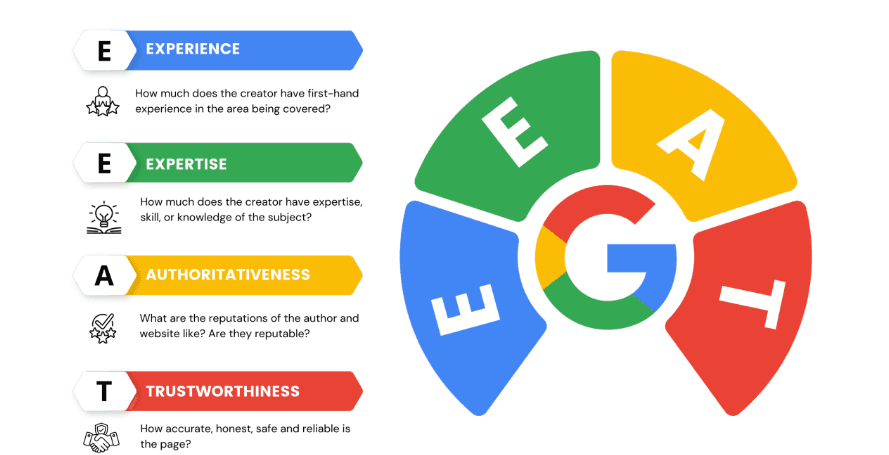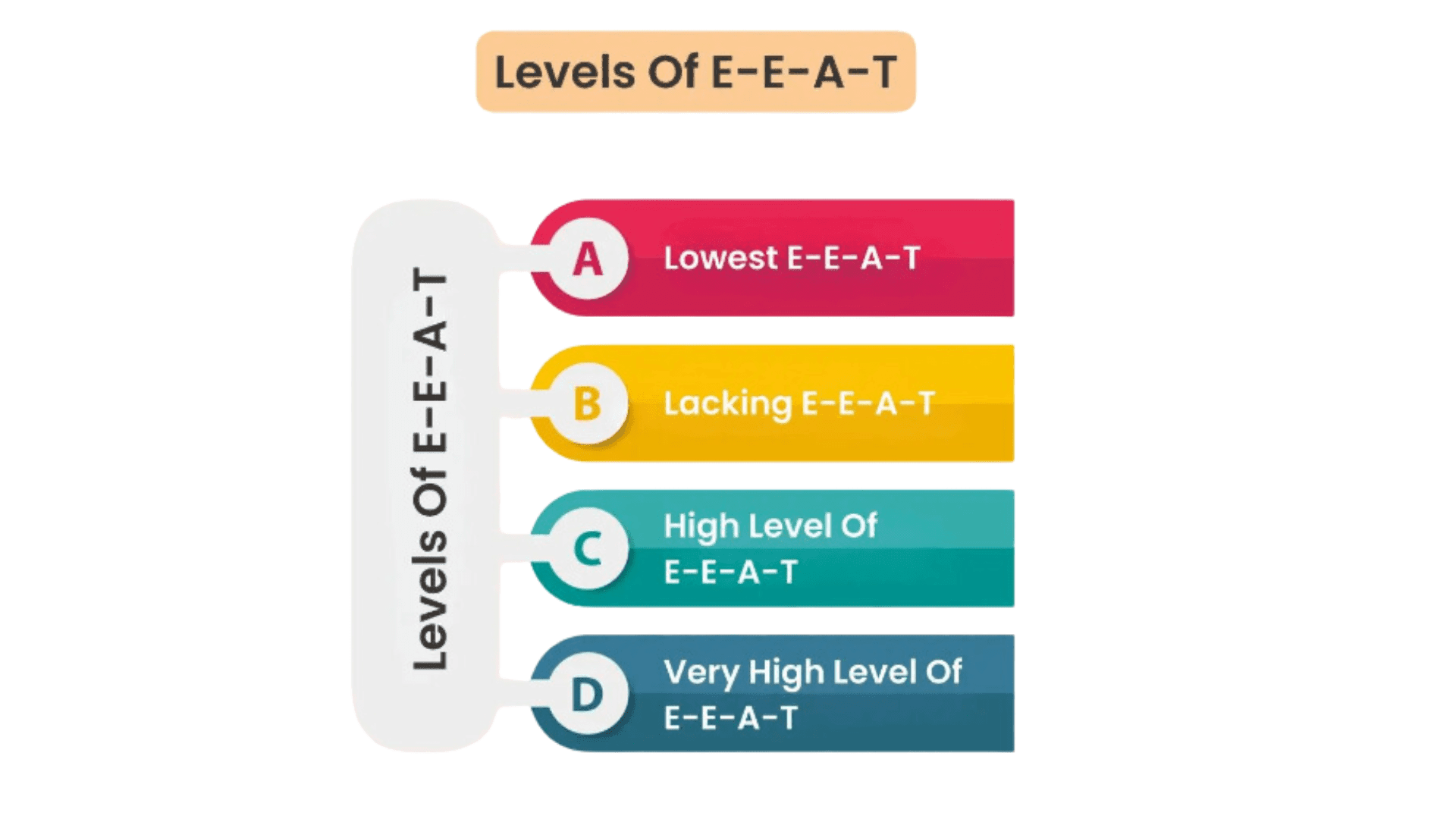Google E-E-A-T is a framework that Google uses to evaluate the quality and credibility of content. Understanding and implementing E-E-A-T principles can significantly impact your website's performance in search engine results.
Let's delve into what E-E-A-T is, why it matters, the different levels of E-E-A-T and 6 practical ways to build E-E-A-T for your site.
What are E-E-A-T Guidelines?
E-E-A-T stands for Experience, Expertise, Authoritativeness, and Trustworthiness. These principles are part of Google's Search Quality Evaluator Guidelines, which human raters use to assess the quality of search results. Although these evaluations don’t directly affect rankings, they provide critical insights into how Google’s algorithms evaluate content.
Understanding and implementing E-E-A-T is essential because it can lead to improved rankings, as websites that meet these criteria are more likely to rank higher in search results. Additionally, adhering to E-E-A-T standards helps build your site's credibility and reliability, which is vital for user trust, while also offering a better user experience. This alignment with E-E-A-T principles generally results in higher engagement and lower bounce rates.

What Does E-E-A-T Stand For?
Experience
Experience refers to the real-life experience of the content creator. Content that demonstrates practical, hands-on experience is often valued more highly than purely theoretical or second-hand information. For instance, first-person reviews, detailed case studies, and tutorials from experienced professionals can significantly enhance perceived value.
Expertise
Expertise reflects the author’s level of knowledge or skill on the topic. It involves having formal or informal education or significant experience in the subject matter. This is particularly crucial for YMYL (Your Money or Your Life) topics, which can impact a person’s health, finances, or safety. Demonstrating expertise might involve highlighting qualifications, sharing author bios, and citing credible sources.
Authoritativeness
Authoritativeness relates to the overall credibility of the website or content creator within the industry. It involves being recognized as a go-to source for information on the topic. This can be established through backlinks from reputable sites, mentions in authoritative publications, and a strong online presence.
Trustworthiness
Trustworthiness involves ensuring that your site is accurate, honest, safe and reliable. It’s about providing transparent, credible, and secure content that users can rely on. By having secure HTTPS connections, transparent business practices, and clear privacy policies, along with user reviews and testimonials, play a significant role in building trust.

Levels of E-E-A-T
Google's perception of E-E-A-T can vary depending on the type of content and the site’s purpose. Here are the levels of E-E-A-T:
1. Lowest E-E-A-T
Pages with the lowest E-E-A-T often lack credibility and can harm users. They typically fail to provide a positive user experience and might promote fraudulent or misleading information.
2. Lacking E-E-A-T
Pages that lack E-E-A-T are created by authors without relevant experience or expertise. While not necessarily harmful, they don’t provide the level of trust and authority expected by users.
3. High E-E-A-T
Pages with high E-E-A-T offer significant first-hand experience, expertise, credibility, and trustworthiness. These pages meet the stated purpose effectively and are created by reputable sources.
4. Very High E-E-A-T
Pages with very high E-E-A-T are created by experts or published on websites that are considered authoritative sources on the topic. These pages are the most trusted sources on the web.

6 Practical Ways to Build E-E-A-T
1. Create a Dedicated Author Page
Establishing credibility starts with showcasing the expertise of your content creators. One of the most effective ways to do this is by creating dedicated author pages for every individual who authors, contributes to, or reviews content.
These pages should serve as comprehensive guides to who the authors are and why they are qualified to write on their respective topics.
Each author page should include comprehensive bios, professional profile pictures, areas of expertise, contact information, and lists of authored posts. Highlight any press features to establish authority and build trust with your audience.
2. Optimise Your About Us Page
Your About Us page is a prime spot to share your brand’s story and connect with your audience. Start by detailing how your business began and the journey that brought you to where you are today. Clearly outline your products or services, and highlight what makes your business trustworthy, such as your experience or industry expertise.
Explain what sets you apart from competitors with your unique selling proposition (USP) and introduce key team members to add a personal touch. Showcase any awards or accreditations to build credibility, and include positive client reviews to foster trust.
Ensure you list your locations for easy visitor access and provide clear contact details. Mentioning notable clients can further enhance your reputation. By including these elements, your About Us page will effectively tell your story and build trust with your audience.
3. Add Must-Have Pages for Your Website
Don't overlook the basics that visitors expect to see when they land on a business website. Essential pages like terms and conditions, privacy policy, cookie policy, returns policy, and delivery information are crucial. Missing these can be a huge red flag for visitors.
For instance, would you trust an e-commerce site without a clear returns policy or transparent delivery information? Probably not. While having these pages doesn’t set you apart, their absence suggests your site could be untrustworthy or even fraudulent.
Additionally, make sure your contact information is easy to find. A contact page with your business's phone number, email address, and physical address helps establish credibility and makes it easier for customers to reach you. Without these basic trust factors in place, gaining customer confidence becomes a challenge.
4. Improve Your Website’s Security
A secure website is crucial for protecting user information and maintaining trust. Start by ensuring your site uses HTTPS to encrypt data, providing a safer browsing experience for your visitors. Regularly update your website’s software, plugins, and systems to prevent security breaches and maintain site integrity.
Displaying trust seals from reputable security providers can further reassure visitors about your site's safety. Additionally, maintaining transparent privacy policies and clearly communicating how you collect and protect user data enhances your credibility with both users and search engines.
For an in-depth guide on technical SEO and site security, read more here: Technical SEO: Maximising Visibility and Performance.
5. Create High-Quality Content
Creating high-quality content is crucial for establishing authority and trust. Start by thoroughly researching and using credible sources, citing studies, and linking out to them. Clearly indicate if the data is your own and regularly update your content.
Demonstrate expertise with your images and media instead of stock photos - smartphone photos often suffice. Earn backlinks from high-authority websites through guest posting and industry collaborations.
High-quality content like infographics, guides, and original research naturally attracts backlinks. Encourage customer reviews and testimonials to build trust and signal reliability to search engines. Add unique insights to your content and fill in what’s missing from top-ranking pages, while also covering topics thoroughly.
6. Maintain a Strong Brand Reputation
A positive brand reputation is crucial for building trust and improving your Google rankings under the E-E-A-T principles.
To build a strong reputation, focus on gathering reviews and testimonials. Ensure that your service, products, and overall customer experience are exceptional. Encourage reviews on platforms like Trustpilot, Yelp, and Google Business Profile. Display these reviews prominently on your site to showcase your credibility.
Respond to all reviews, both negative and positive. Address negative feedback transparently, offering solutions or apologies, and thank users for positive reviews. This active engagement demonstrates your commitment to customer satisfaction and helps build a trustworthy reputation, aligning with Google’s E-E-A-T guidelines for better search rankings.

E-E-A-T Your Way to the Top
Incorporating Google E-E-A-T principles into your SEO strategy is essential for building high-quality, trustworthy content that resonates with both users and search engines. By focusing on experience, expertise, authoritativeness, and trustworthiness, you can improve your site's visibility and credibility. Remember, E-E-A-T is not just a set of guidelines but a mindset for creating valuable, user-centric content that stands the test of time.
Ready to take your website to the next level? Start implementing E-E-A-T principles today, and watch your online presence thrive!
Need help? Contact Cogify today! Let's transform your digital strategy together!






